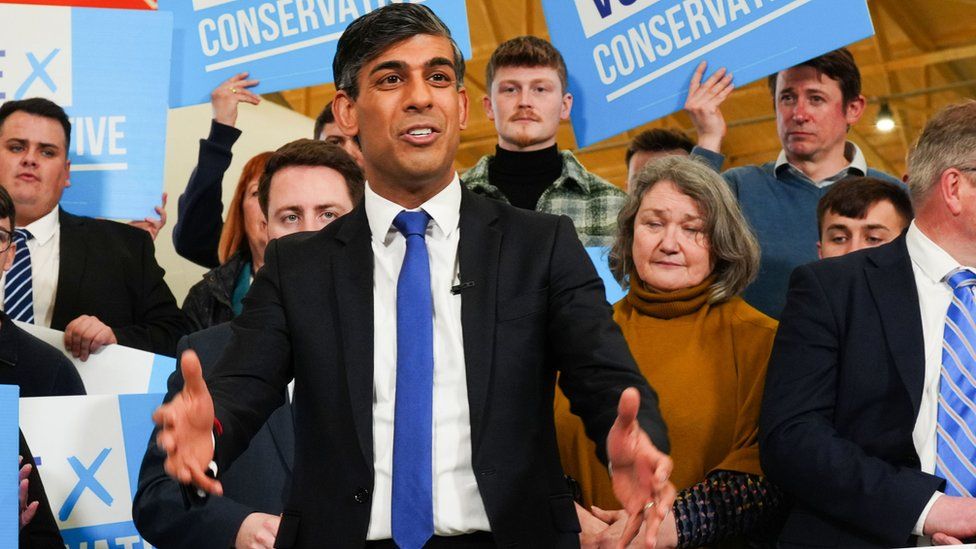
By Sam Francis
Political reporter, BBC News
The Conservatives have endured one of their worst local election results in a decade in the last big test of public opinion before a general election.
The Tories lost nearly half the seats they contested, with only a handful of council and mayoral results pending.
In contrast, Labour won key councils, regional mayors and a decisive victory in the Blackpool South by-election.
The PM called the results “disappointing” but denied Labour was on track for a general election win.
In a rare bright spot for the Tories, Ben Houchen was elected for a third term in Tees Valley, with a much reduced majority.
Speaking at a press event in Teesside International Airport, Mr Sunak said the results showed at the general election election voters “are going to stick with us”.
Mr Sunak said Labour “knew they have to win here in order to win a general election”, but said voters know “the Conservatives are building a brighter future for Teesside and a brighter future of Britain”.
In total, the Conservatives lost 10 councils and more than 400 councillors in England.
Labour emerged as the main beneficiary, gaining 169 new councillors and making advances in areas the party claim point toward a general election victory.
The party also won all three of the newly created regional mayors in the East Midlands, North East and York and North Yorkshire.
Speaking at Northallerton Town Football Club in North Yorkshire, Labour Leader Sir Keir Starmer said the result was a “historic victory” for Labour in “the heart of Tory territory”.
The newly created York and North Yorkshire mayoralty includes Mr Sunak’s Richmond constituency.
He said: “We’ve had a positive campaign here and I am very, very proud to stand here as leader of the Labour Party to celebrate this historic victory.
“And it is a historic victory – these are places where we would not have usually had a Labour Party success but we’ve been able to create that success and persuade people to vote for us.”
The local election results so far yielded a wealth of results for the parties to pore over with around 2,600 seats contested across 107 councils, 37 police and crime commissioners, and 11 local mayors.
Results will continue to come in on Saturday and Sunday.
Research by Sir John Curtice for the BBC estimates that, if the whole country had had an election on Thursday and behaved in a similar manner to those places that did, the outcome would be Labour on 34% and the Conservatives on 25%.
Meanwhile, national polling puts Labour on as much as 20 points ahead of the Conservatives in general election intentions.
Both Labour and the Liberal Democrats are now calling for Mr Sunak to call for a general election.
Watch: England and Wales local elections… in 60 seconds
Gaining nearly 100 new councillors, the Liberal Democrats said they have proved they can benefit from Conservative difficulties.
The Green Party just missed out on its target of taking over Bristol Council, but continued to gain ground winning 66 new seats.
Meanwhile, Reform are averaging 12% of the vote in wards where they are standing, and came third in the Blackpool by-election, 117 votes behind the Tories.
Despite the poor results, there is no sign of an internal revolt against the prime minister’s leadership. There are only two MPs who have publicly called for a change of leader – and no-one new voices joining that band in response to these results.
Holding on to the Tees Valley mayoralty may have provided Mr Sunak with a lifeline.
But as leading elections expert Sir John Curtice pointed out, Lord Houchen’s success was “heavily personal” and the results unreliable indicators of Conservative prospects in a general election.
MPs have reported to the BBC’s chief political correspondent Henry Zeffman that seeing a popular independent-minded local incumbent defy a national trend is compelling. Many MPs believe they have strong personal votes – even if there is little academic evidence for that.
The results from the remaining votes could still prove to be pivotal to the two leading parties.
Sir John Curtice said the Tories could be on course to lose 500 councillors – making it “one of the worst, if not the worst” performances by the party in 40 years.
Five council elections are still to come in, with but all eyes will be on the remaining seven mayoral races due to be announced by the end of Saturday – they include London, Greater Manchester, Liverpool City Region, Salford, West Yorkshire, West Midlands and South Yorkshire.
The outcomes in London and Greater Manchester – currently held by two of Labour’s biggest national figures in Sadiq Khan and Andy Burnham – will be crucial for gauging the party’s public support.








